Vice Provost View: Shaping UCL’s distinctive approach to global engagement for the next five years
11 December 2019
Dr Dame Nicola Brewer reflects on the challenges and progress of the Global Engagement Strategy (GES) 2015–20 and looks ahead to the priorities for the next GES, due to launch next year.
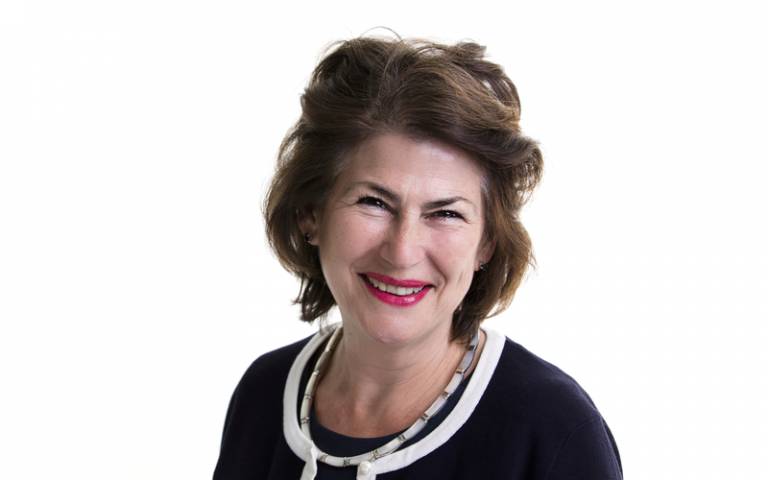
I doubt many people would disagree that the global context we’re working in today is very different from how it was five years ago. In 2014, when we ran over 70 consultation events to develop UCL’s first Global Engagement Strategy (GES), no one was talking about Brexit or US/China trade wars. The Sustainable Development Goals didn’t exist. Given all the changes since 2014, our GES – with a few changes made in late 2016 after the EU Referendum – proved to be pretty robust and flexible. But, like all good strategies it needs to be reviewed and updated. As you may have heard at one of the 50+ consultation events we’ve run so far this year, we’re now working on the next 5-year strategy, to launch in 2020/21.
We’re looking back, learning from what UCL has achieved over the past 4 and a bit years. And looking forward to what should be in the next strategy. In March this year, we kicked off the consultation at the Leadership Forum with Heads of Department and professional services directors. My team and our academic networks of Vice Deans International and Regional Pro-Vice-Provosts have been consulting with the UCL community to hear what you think has worked well and what you’d like to see more, or less, of in the next phase of the strategy. We have more consultation events still to come.
What we’re hearing so far is that the framework is still broadly right for UCL. But there’s appetite to be more ambitious – as usual at UCL! We’re being encouraged to think about additional routes to global impact, as well as through global partnerships with universities and through strategic international programmes like the Africa Health Research Institute. All of these international initiatives are designed to support UCL’s academic mission and the international activities led by a very wide range of staff and students. More about that in the ‘looking forward’ section. But firstly a look back at what the GES – delivered by academic and professional services colleagues across UCL, not just through the small central Global Engagement Office – has achieved up to now.
Progress so far
UCL’s approach to global engagement – inclusive but focussed – helps us to push back against a prevailing political discourse in the UK that tends to be nationalist and inward looking. That context makes global engagement – “efforts to build bridges” as I heard one Professor in the IOE describe it recently – both harder and more important than ever.
Despite that backdrop, we’ve managed to make good progress. UCL already enjoyed a rapidly growing reputation for research power and academic excellence (REF 2014 was a great baseline). And now we’re well on the way to building an associated reputation for a distinctive and effective approach to global engagement. In my last VP View, I said that I believe UCL has the potential to become one – maybe even the founder – of a relatively small network of world leading universities which all have global ambitions supporting their academic missions. That’s still true, but it’s not yet a given. Like fundraising, you can’t turn international relationship building on and off like a switch: global engagement is a process not an event.
Almost five years on from the start of the 2015-2020 GES, we’ve got well-established academic networks across the university; sustained commitment from delivery partners; popular seed-funding schemes with a loosely calculated ‘return on investment’ of 1:30 (recipients of £762k of Global Engagement funding over four years tell us that it has so far led to more than £23.3m of external funding); and stronger global partnerships through which to collaborate on research, education and enterprise.
We’ve quietly and successfully concluded two of UCL’s three overseas presences. The third and final campus, in Qatar, will close in 2020/21 and leave a positive legacy. Staff and students say they have found UCL’s Brexit mitigation work and communications helpful, a collective effort coordinated by GEO. We launched the first two cycles of the Cities partnerships Programme (CpP), in Rome and Paris, and are primed to appoint a third Academic Director for a third European city. Dr Florian Mussgnug will complete delivery of the first three-year cycle in Rome, and then we’ll jointly take stock of lessons learned before re-launching, outside Europe, in 2022/23.
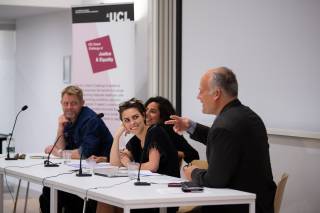
HESA data shows that the efforts of colleagues in the Study Abroad team and in Faculties to expand student mobility have really paid off. We’ve just heard that UCL has exceeded its target of 30% undergraduate mobility by 2020, increasing from a baseline of 21.5% in 2013/14 to 32% in 2018/19. And we should be proud, but not complacent, that UCL – through the work many of you are doing across the university – has retained its position as the biggest recruiter of international students in the Russell Group.
And, in collaboration with colleagues in Student Registry Services, the Office of the Vice Provost Education and Student Affairs and UCL Finance, we also delivered the key ‘asks’ from students during the consultation in 2014/15: greater predictability of international student fees; more international mobility opportunities; and we are on track to increase ‘academic literacy’ support.
Looking ahead
Looking to 2020-2025, here are a few of the things you’re telling us should be priorities for UCL’s future global engagement:
- more engagement with students and education, including around global citizenship and beyond the UG student mobility work we’re already doing (though we’re being encouraged to continue that). Key student asks this time around include more inter-cultural opportunities to bring together home and international students - possibly by creating regional student champions working with our Regional Pro-Vice-Provosts; increasing international activity in collaboration with the Students Union, and more post-graduate and PhD mobility.
- aligning and articulating our impact on global goals, particularly the UN’s Sustainable Development Goals (SDGs), which encapsulate other key emerging themes such as EDI and sustainability. We’re working closely with colleagues from across UCL on this, and particularly closely with OVPR and the Grand Challenges team headed by Ian Scott; we’ll jointly be running an SDG focussed conference in autumn 2020 (thanks to Professors Ijeoma Uchegbu and Monica Lakhanpaul for leading on this for GEO). We’re also being asked to explore how we can engage more effectively with multilateral organisations such U7+, LERU, and the WEF, something I’m aware academic colleagues already do a lot of.
- increasing the impact of academic research - and therefore UCL – through more global profile raising work. I frequently hear from colleagues that they’re impatient to see UCL’s global profile catch up with its academic standing. We need to work closely with colleagues in Communications and Marketing, to speed this up. More about how we might do this in the sections on thought leadership and alumni below.
- a clearer focus on the enterprise dimension and on London, working with Professor Alan Thompson, the new PVP London, to support bi-annual showcase events and seed-fund enterprise through links with embassies, Government departments and boroughs.
We’ve had interesting discussions about theories of change and routes to global impact, in particular with Professor Mariana Mazzucato who heads up the Institute for Innovation and Public Purpose, and Professor Henrietta Moore, who leads the Institute for Global Prosperity. Strategic partnerships with like-minded universities around the world can definitely make academic collaboration easier. For example, our first PhD exchange and co-supervision programme will likely be with our strategic partner the University of Toronto, with whom Prof Suellen Walker in the Institute of Child Health is working to understand chronic pain in children. Our emerging view is to set a limit on the number of strategic partnerships, but keep flexibility on which to include and resource over time, as personalities and priorities – on both sides – change.
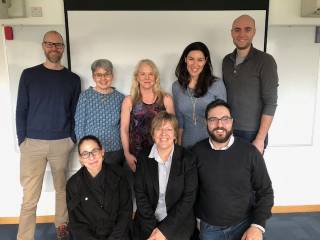
Major, long-term international programmes like AHRI have the potential for huge impact on people’s lives. In the consultations we’re also hearing about other ways of having impact (perhaps influenced by the next REF getting closer). One new route we’re calling as a shorthand working title (please send us any better suggestions you can come up with) ‘Translating thought leadership into practice’ (thank you to Professor Aimee Spector for mulling this over with me on a recent delegation visit to China). This is about seeking to support cross-institutionally what academic colleagues refer to as clusters (or nodes or hubs) of expertise and excellence. These act as magnets for multilateral organisations and other international players (usually outside the HE sector) seeking new ideas and solutions to policy questions and practical challenges. It’s also about the thought leadership UCL academics and practitioners bring.
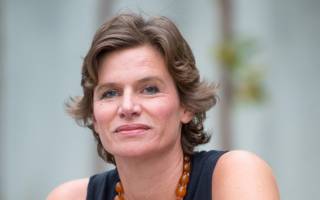
The consultations have also highlighted a desire to expand our connections with alumni, both at home and overseas. I know from Professor Hazel Genn, who heads up our academic networks as Pro-Vice Provost International, that there was a lot of conversation and support for this at a recent meeting of the networks. Working closely with OVPA we’re informally calling this route ‘Alumni advocates’, again a working title. This is likely to include more work to connect the academic community with UCL alumni, as well as greater involvement of alumni in profile-raising, and in-country activity.
We’ll work with an increasing number of colleagues across UCL to design and deliver these new activities. Half of the current GES is delivered outside GEO, and we expect this proportion to stay roughly the same. In some cases, that will mean providing additional support to successful activity that’s already working well, like our seed funding. Other areas, such as exploring income-generating international education and training programmes to help fund the cost of stepping up our global engagement activity (we have a pilot with the IOE in Qatar) mean we’ll need to establish new ways of working and business development.
We’re working on another kind of off-setting, too. Geraint Rees, Richard Jackson and the Sustainability team are helping us to think carefully about our carbon footprint. We’ll try to mainstream sustainability – in all senses of the word, including diversity and inclusion – in the next GES. This might mean state-of-the-art conferencing equipment to reduce the amount we all travel, as well as ensuring we’re getting the most out of delegation visits when travel is the best way to make lasting connections.
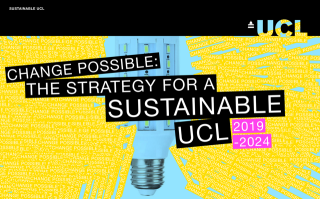
I’d very much like to hear what you think about these and other ideas emerging from the consultations on GES 2020-2025. If you haven’t already had an opportunity to feed into a consultation in your part of UCL, or even if you have but have more feedback to give, please do complete this short survey. It should only take five minutes, and will help shape the next five years of global engagement at UCL.
 Close
Close

